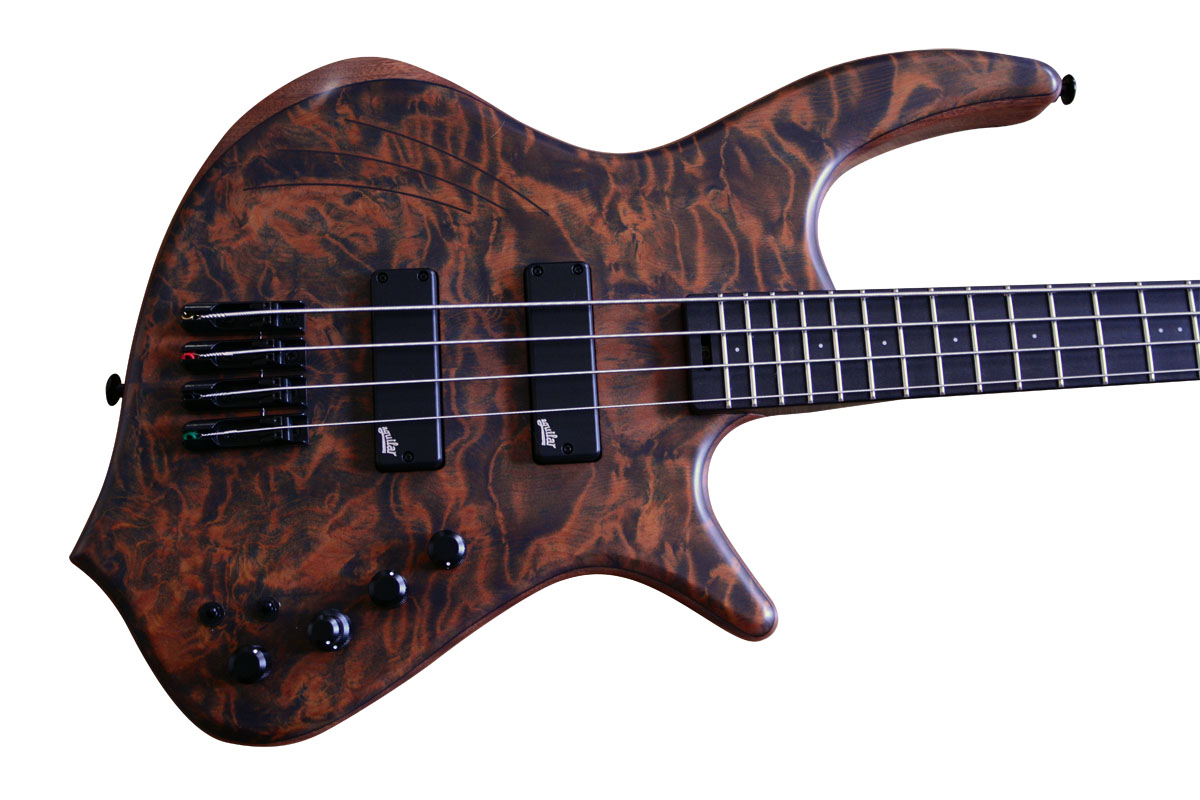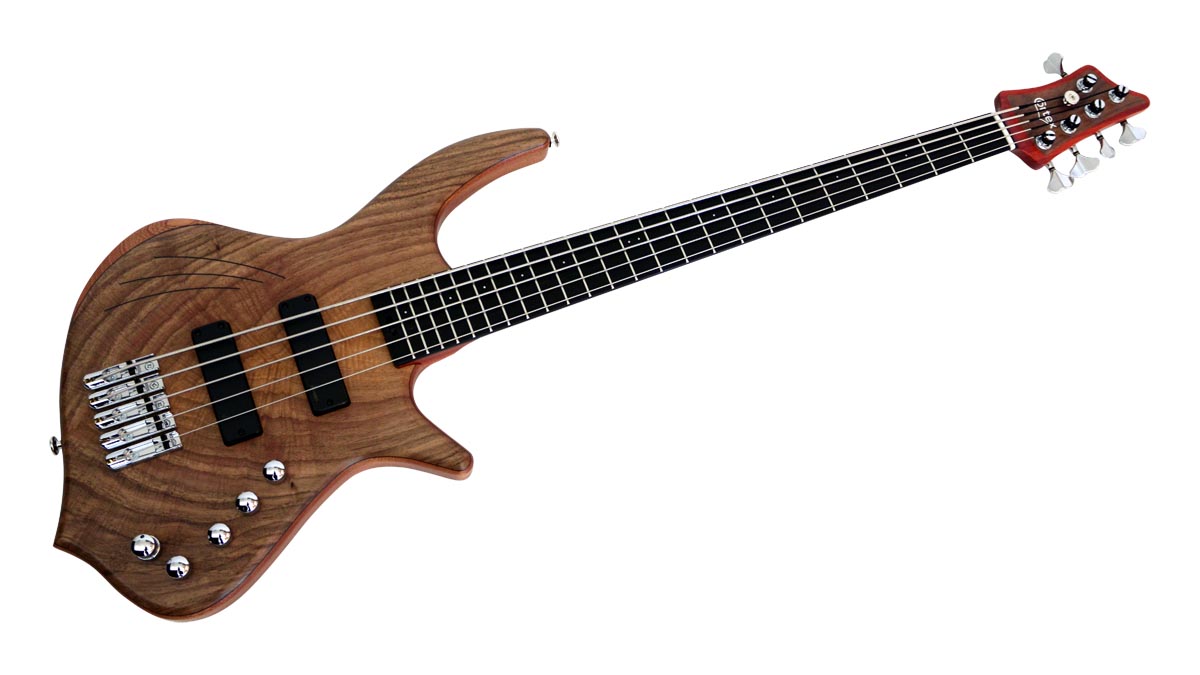Guitar World Verdict
Fine instruments, well suited to professional players, the Cortex Napoleon Deluxe format offers an exceptional level of sophistication with plenty of custom options to tailor them to your style.
Pros
- +
Tonal variety.
- +
Outstanding playability.
- +
Flawless build and setup.
- +
Cortex offers plenty of pickup options.
Cons
- -
The shape might not suit everyone.
You can trust Guitar World
Cortex basses are the brainchild of French luthier Pierre Camilleri, who worked with fellow builder Paul Lairat to develop the Napoleon model.
This instrument is available in both Standard and Deluxe versions, with the ethos of Cortex being to combine the three concepts of European sourcing, Swiss precision and high-end French luxury finishing. We have Deluxe four- and five-string models to put through their paces.
Build Quality
Each of our review basses has a mahogany body, with the four-string topped with curly redwood, and the five-string sporting a walnut top. Each instrument has a decorative ‘tattoo’, three curved lines radiating from above the neck pickup and sweeping backwards.
According to Cortex, these lines ‘symbolize partnership and friendship, the whole story behind the birth of the Cortex bass’. An interesting adornment for sure, but one that is a little lost on the dark ripple of the curly redwood. Our four-string model has a chocolate maple neck topped with an ebony fingerboard, while the five-string has a padouk neck, again with an ebony board.

It’s difficult to miss the unusual body-shaping that has been employed here: The lower bout of the Napoleon is slightly extended, making for a sleek-looking instrument that visibly deviates from the design norm.
A further quirk appears at the other end of these instruments: While the headstocks themselves are conventional in terms of shape, the arrangement of the tuners is anything but: On each, only a single peg adorns the top edge, with the others occupying the lower edge.
The intention here is to offer the lowest string added slack behind the nut, giving them a longer scale. Build quality is of an exceptionally high standard across both instruments. Fretwork is faultless, and the instruments arrived beautifully set up and ready to play.
All the latest guitar news, interviews, lessons, reviews, deals and more, direct to your inbox!
The finishing is impeccably smooth, making the instruments incredibly tactile. Opening up the rear of the instruments reveals neat and well-screened electronics cavities, tidy wiring and – unusually – 9V batteries nestled within snug fabric pouches sealed with poppers.
The cover for the electronics cavity is made from a much lighter lumber than the dark mahogany of the body, and to my mind, looks out of place. This is a minor complaint that is relegated to the rear of the instrument, however.
In terms of hardware, each bass makes use of monorail bridges, in black and chrome on the four- and five-string respectively. Interestingly, truss rod access has been enabled through the use of a spoke wheel, which is accessed via a small port cut into the fingerboard just beyond the 24th fret.
This is one of the neatest ways of adjusting the truss rod that I’ve seen – spoke wheels make life infinitely easier when it comes to truss rod adjustment, but aren’t the nicest things to look at. Concealing them in this way – while keeping them accessible – makes perfect sense.
Various pickups and electronic packages are available from Cortex. Our four-string has Aguilar DCB pickups and an Aguilar OBP3 preamp, while the five-string has less conventional Duvoisin pure active split-coil in-line humbucking pickups and a three-volt preamp.
Sounds And Playability
Plugging in the four-string reveals a versatile tonal palette which serves differing playing techniques and styles effectively. The three-band EQ of the OBP3 preamp also offers a selectable mid frequency via one of the toggle switches: 400Hz, or 800Hz, adjustable plus/minus 16dB via the mid control. In practice, we find this useful, with each position offering added punch just where you might need it.

• Best bass guitars: top 4-string and 5-string bass guitars for all budgets
Turning to the five-string, the Duvoisin preamp has controls for master volume and blend, followed by a medium progressive frequency selector (250-830Hz), mid boost and stacked treble/bass controls. The frequency selector is very effective, enabling midrange boosts through a range of useful frequencies – ideal for punching through a mix or achieving a little extra clarity in an acoustically deficient room.
Some experimentation is needed in order to get the best from this system, but once you understand the possibilities, it’s very versatile. In use, the necks of these basses are a pleasure to navigate, with upper fret access incredibly easy thanks to a comfortable heel design and a cutaway that begins beyond the 24th fret.
For me, the unusual body shape takes some adjusting to when seated, as the lower cutaway naturally positions the instrument further over to the left than many players might be used to.
This makes the instruments feel longer and increases headstock dive, although neither factor is an issue when standing with the instrument. It’s also worth noting that the body shaping requires the Napoleon model to be kept on a guitar stand, although I doubt many would want to lean a boutique instrument against the wall anyway.
Conclusion
The Cortex Napoleon basses have much to offer. They are beautifully made, tonally versatile instruments, with a unique look. Potential customers will no doubt enjoy playing these basses, although we’d recommend a thorough test drive as the body shapes may require some adjustment.
Specs
- PRICE: $3,115 (five-string $3,210) approx, plus taxes and shipping
- MADE IN: France
- BODY: Mahogany with curly redwood (Walnut) top
- NECK: Chocolate Maple (Padouk)
- FINGERBOARD: Ebony
- FRETS: 24
- PICKUPS: Aguilar DCB (Duvoisin humbuckers)
- ELECTRONICS: Aguilar OBP3 (Duvoisin)
- BRIDGE: ABM
- HARDWARE: PL by Gotoh
- CASE/GIG BAG INCLUDED: Gig bag
- LEFT-HANDED OPTION AVAILABLE: No
- CONTACT: Cortex

